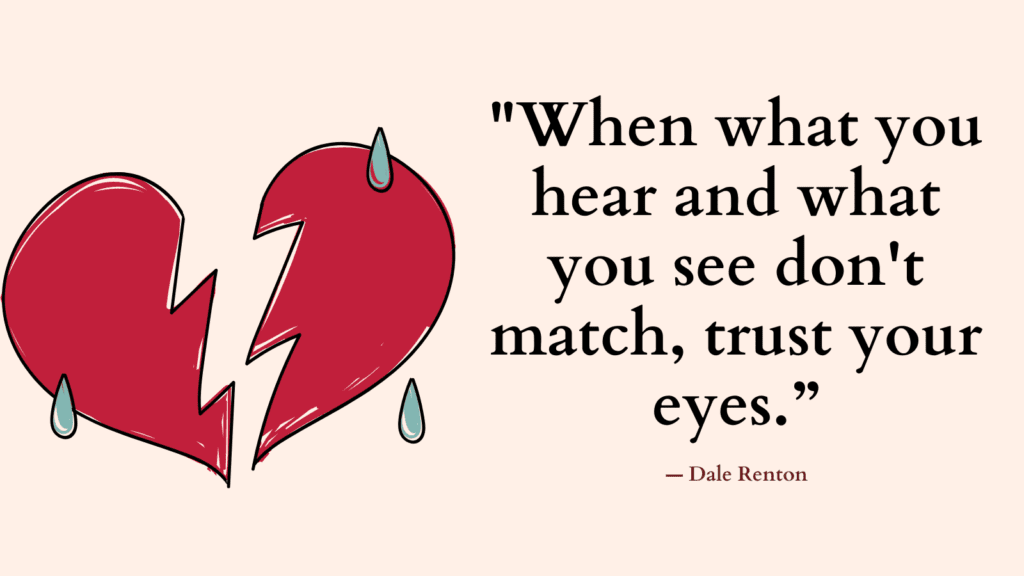This post contains “Is my boyfriend a compulsive liar quiz”.
Who Is The Compulsive Liar?
A compulsive liar is a liar who lies incessantly to get their way and does so with little awareness.
Compulsive lying can begin as a coping mechanism in early childhood where lying was necessary (e.g. to avoid abuse or punishment) and routine.
Compulsive liars are not overly manipulative and cunning. They lie for no reason and often for no real benefit.
Lying, for them, is an automatic response that feels right and easier than telling the truth.
They often get caught because their stories don’t add up and they usually display classic lying behaviors, such as avoiding eye contact, tripping over their words, etc.
Is My Boyfriend A Compulsive Liar Quiz
Results
#1. Do they often lie about insignificant details and often for no apparent benefit?
#2. Do they tend to contradict themselves?
#3. Have they been lying for a long period of time?
#4. Do they tend to display classic lying behaviors (e.g. getting nervous, avoiding eye contact, tripping over their words, hesitating, changing their voice pitch or speed, filling natural pauses, etc.)?
#5. Do their stories tend to dramatic, complicated, and very detailed?
#6. Do they admit to lying when confronted (even if that doesn’t make them change and stop lying)?
#7. Do they show remorse and empathy (i.e. they care about others even if they still have a habit of telling lies)?
This quiz is for informational purposes only. It is not meant as a diagnostic or assessment tool.
Results
The questions above represent common signs of compulsive lying. If you answered yes to most of these questions, then your partner might be a compulsive liar.
What Constitutes A Lie?
A lie is an insincere assertion.
It can be a false statement with the intention to deceive.
It can also be a half-truth that contain some but not all true information, with the intention of presenting what is true in a misleading way.
It can also be a promise, which the liar does not intend to keep.
A lie can also be expressed through a gesture implying agreement or even silence when the liar knows what we understood is untrue.
Related: Is My Boyfriend A Sociopath Quiz
Lying Continuum
Lies exist on a continuum from everyday, white lies to more serious lies.
Liars also exist on a continuum from occasional to compulsive liars.
Factors like not getting caught and cost-benefit analysis favoring lying, can encourage compulsive liars to continue to do it.
Eventually, it becomes a habitual way of life.
Why Do Compulsive Liars Lie?
There are dozens of reasons for lying. The following is a list of common ones:
- To make someone feel better
- To spare someone from getting hurt
- To gain an advantage
- To get out of an undesired situation
- To appear more likable
- To hide a mistake
- To keep a secret
- To seek revenge
- To avoid embarrassment
Whatever the reason behind a lie, an underlying reason for all lying is that it is a form of self-defense or coping mechanism.
Often, telling the truth can be too upsetting or too hurtful to acknowledge.
Related: How to Deal With A Sociopath? 21 Clear Traits of A Sociopath You Need to Watch Out For
Compulsive Lying vs. Pathological Lying
Compulsive liars lie out of habit and do so uncontrollably, with little awareness.
While pathological lying, also known as pseudologia fantastica or mythomania, is often goal-oriented (i.e., one tells lies to get what they want) and with little regard or respect for the feelings of others.
Pathological lying is considered manipulative and cunning. They know how to be confident while lying (e.g. fixing their gaze upon you rather than looking away).
Unlike compulsive liars, pathological liars often believe their own lies and may have a weak grip on reality and this makes them almost impossible to catch in the act.
Pathological lying is often associated with mental health disorders like antisocial personality disorder (APD) or narcissistic personality disorder (NPD).
Compulsive lying is often associated with mental health disorder like attention deficit hyperactivity disorder (ADHD), bipolar disorder, Substance dependency, and borderline personality disorder.
Related: Is My Boyfriend A Psychopath Quiz
| Compulsive liars | Pathological liars |
|---|---|
| They’re not manipulative or cunning. They lie out of habit. | They lie to gain something. |
| They know the difference between reality and lies. | They believe their lies and live in a false sense of reality. |
| They’re easily caught because their stories usually do not add up. | They exaggerate things and keep on changing their stories. |
| They display the classic lying behaviors (e.g. avoid eye contact, trip over their words, etc.). | They’re hard to catch because they exhibit confidence while lying. |
| They are likely to admit to lying when confronted. | They never admit to their lies, even when confronted. |
Related: Top 21 Pathological Liar Quotes That Will Make You Feel Less Alone
How Do You Deal With A Compulsive Liar?
Being in a relationship with a compulsive liar can be exasperating.
Over time, you may find it difficult to trust them.
If you believe you’re in a relationship with a compulsive liar, the following tips can help you cope:
1. Call Them Out
Unlike pathological liars, compulsive liars are more likely to admit to their lies when confronted.
When you catch a lie, let them know that you’re aware they’re lying. Let them know how that makes you feel and how important it is for you to maintain an honest relationship.
If they admit to lying and show remorse, encourage them to seek professional help.
2. Walk Away
If they refuse to admit to lying or refuse to seek help, you may need to end the relationship.
Because of the psychological effects of being lied to (e.g. being gaslighted), you may also feel the need to seek professional help.
3. Let Go of Self-Blame
Being lied to and deceived can leave you with a sense of shame and feelings of self-blame.
You may blame yourself for not seeing the warning signs or for ignoring your gut feeling.
Truth is people can be primed for being easily deceived.
Most of us, expect to be told the truth and our moral codes and society enforces the belief that lying is wrong.
It’s only natural that without knowing what to look for you could only trust and believe this person.
Related: Top 25 Signs You’re Dating a Psychopath – and How to Heal From Psychopathic Abuse

References
- Pathological lying – Wikipedia
- Pathological Liar: How to Cope with Someone’s Compulsive Lies (healthline.com)
- Pathological liars: Everything you need to know (medicalnewstoday.com)
- Compulsive Liar vs. Pathological Liar: Traits, Mental Health, and More (psychcentral.com)
- What Is Pathological Lying, and Can It Be Treated? (webmd.com)
- Pathological Liar: Definition and How to Spot One (verywellmind.com)
- Pathological Lying: Theoretical and Empirical Support for a Diagnostic Entity | Psychiatric Research and Clinical Practice (psychiatryonline.org)
- Pathological lying revisited – PubMed (nih.gov)
- (PDF) Pathological Lying: Theoretical and Empirical Support for a Diagnostic Entity (researchgate.net)







